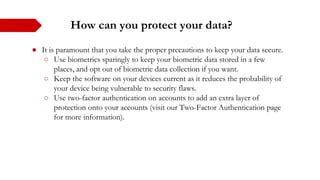In today’s digital age, biometric data is collected more widely than ever before. From facial recognition to fingerprint scans, our unique physical and behavioral characteristics are being used to identify, track, and even authenticate us.

While biometric data can offer convenience and security, it also raises serious privacy concerns. The potential for misuse, discrimination, and surveillance is significant, and many people are questioning whether they have the right to opt-out of biometric data collection.
Legal Framework for Biometric Data Collection
The legal framework for biometric data collection varies from country to country. In the United States, the collection and use of biometric data is generally governed by state laws, which vary widely.
Some states have enacted comprehensive biometric privacy laws, such as the Illinois Biometric Information Privacy Act (BIPA). BIPA provides individuals with the right to opt-out of biometric data collection, and it imposes strict requirements on businesses that collect and store biometric data.
Other states have more limited biometric privacy laws, or no laws at all. This patchwork of laws can make it difficult for individuals to understand their rights and to protect their biometric data.
Types of Biometric Data
Biometric data can be divided into two main categories: physical characteristics and behavioral characteristics. Physical characteristics include fingerprints, facial features, iris patterns, and DNA. Behavioral characteristics include voice patterns, gait, and typing patterns.
Risks of Biometric Data Collection
The collection and use of biometric data poses a number of risks to privacy and security. These risks include:
- Misuse: Biometric data can be used to identify, track, and authenticate individuals without their knowledge or consent. This data could be used for nefarious purposes, such as stalking, harassment, or fraud.
- Discrimination: Biometric data could be used to discriminate against individuals based on their race, gender, or other protected characteristics. For example, facial recognition technology has been shown to be less accurate in identifying people of color than white people.
- Surveillance: Biometric data can be used to track and monitor individuals’ movements and activities. This data could be used for law enforcement purposes, but it could also be used for commercial purposes, such as targeted advertising.
Can I Opt-Out of Biometric Data Collection?
In many cases, you may have the right to opt-out of biometric data collection. However, the specific rules vary depending on the jurisdiction and the type of biometric data being collected.
Physical Characteristics
In general, you have the right to opt-out of the collection of your physical characteristics, such as fingerprints and facial features. This is because these characteristics are considered to be “sensitive” biometric data.
However, there are some exceptions to this rule. For example, you may be required to provide your fingerprints or facial scan for law enforcement purposes.
Behavioral Characteristics
The rules governing the collection of behavioral characteristics are less clear. In some cases, you may have the right to opt-out of the collection of your behavioral characteristics, such as your voice pattern or gait. However, in other cases, you may not have this right.
For example, your employer may be able to collect your voice pattern or gait without your consent if it is necessary for security purposes.
Tips for Opting Out of Biometric Data Collection
If you are concerned about the privacy risks of biometric data collection, you can take steps to opt-out of this practice. Here are a few tips:
- Review your privacy settings: Many companies collect biometric data through their apps and websites. Be sure to review your privacy settings and opt-out of any biometric data collection that you do not want to participate in.
- Use privacy-enhancing tools: There are a number of privacy-enhancing tools that can help you to protect your biometric data. For example, you can use a VPN to encrypt your internet traffic and prevent websites from tracking your movements.
- Be aware of your rights: In many cases, you have the right to opt-out of biometric data collection. Be sure to research your rights and to assert them whenever possible.
FAQs
Here are some frequently asked questions about opting out of biometric data collection:
1. Can I opt-out of biometric data collection for law enforcement purposes?
In most cases, you cannot opt-out of biometric data collection for law enforcement purposes. However, there are some exceptions to this rule. For example, you may be able to opt-out of facial recognition technology if it is being used in a discriminatory manner.
2. Can I opt-out of biometric data collection for commercial purposes?
In many cases, you can opt-out of biometric data collection for commercial purposes. However, there are some exceptions to this rule. For example, you may not be able to opt-out of biometric data collection if it is necessary for security purposes.
3. What should I do if I believe my biometric data has been collected without my consent?
If you believe that your biometric data has been collected without your consent, you should contact the company or organization that collected the data. You may also want to contact your state’s Attorney General or the Federal Trade Commission (FTC).
4. What are the penalties for violating biometric privacy laws?
The penalties for violating biometric privacy laws vary from state to state. In some states, violations of biometric privacy laws can result in civil penalties, criminal penalties, or both.
Conclusion
Biometric data collection is a growing concern, and it is important to understand your rights and to protect your privacy. In many cases, you have the right to opt-out of biometric data collection. However, the specific rules vary depending on the jurisdiction and the type of biometric data being collected.
It is important to be aware of your rights and to assert them whenever possible. You can also take steps to protect your biometric data by using privacy-enhancing tools and by being mindful of the information that you share online.



